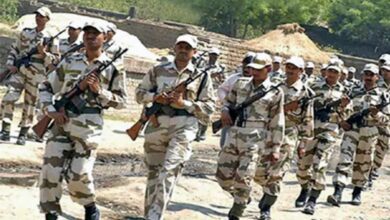Students from the school take over the HP assembly for a mock meeting and call for harsh action against drug traffickers
On Monday, schoolchildren seized control of the Himachal Pradesh Assembly for one and a half hours, taking part in a fake session during which “opposition MLAs” stormed the Well of the House and demanded that action be taken against the drug dealers. The state’s Education Department chose the one-day MLAs from 1,085 applicants, and they brought up the drug epidemic at the Vidhan Sabha’s “Bal Satra,” or children’s session. Jahaanvi assumed the position of chief minister of Himachal Pradesh for the first time ever during the pretend session. The opposition party’s MLAs said that the state’s drug problem is so severe that parents are now afraid to let their children leave the house. They claimed that the state administration is only arresting a small number of drug dealers in the name of reducing the problem.
They sang anti-government chants, marched to the Well of the House, and referred to the state government as the “government of assurance” while calling for drastic action to end the drug epidemic in the state. “We are aware of the opposition leaders’ worries. To the opposition leader, my response could appear like a formality, but my administration cares about its citizens’ issues, Jahaanvi added, ordering the home minister to take strong action in this case. Earlier, in response to a question, Deputy Chief Minister Tushar Anand told the parliament that Himachal Pradesh is home to 91 “Nasha Mukti Kenderiya” (addiction treatment centers).
He said that the majority of these facilities are located in the bordering districts of Solan, Una, and Kangra because “chitta,” a particularly potent substance, is trafficked via these regions to Shimla, the region’s capital. During the question period, the MLAs asked a number of inquiries on a variety of different topics, including career counseling for young people, environmental protection, sports and health facilities, water difficulties, the state’s financial situation, the poor condition of temple roads, paper leaks, and a lack of parking. The behavior and discipline of youngsters might teach politicians a valuable lesson.
Only 28 out of the 68 lawmakers in the Himachal Pradesh Vidhan Sabha were male, which is an interesting fact. During the one-and-a-half-hour meeting, the MLAs also discussed other issues and offered their recommendations on how to increase revenue by promoting health and apple tourism, increase women’s political participation, legalize hemp, and address problems like depression and stress brought on by Covid-19 and the threat posed by stray animals. Other recommendations made by the young lawmakers included switching from hydropower to solar energy, lowering accidents by erecting crash barriers, charging a tax on cars coming from other states, and introducing a policy for the elderly as well as for the adoption of children with special needs.
In a later speech to the students, Chief Minister Sukhvinder Singh Sukhu emphasized the importance of women in his administration, noting that 37% of the victors in the recent Himachal panchayat elections were female. He said, even 21 of the 36 council members of the Shimla Municipal Corporation (SMC) are female. The state administration will consider implementing a 10-minute yoga class in schools, according to the Congress leader. About 50,000 people, according to Vidhan Sabha Speaker Kuldeep Singh Pathania, took part in the three-month-long “Baccho Ki Sarkar Kaisi Ho” campaign run by the Himachal Pradesh Education Department. Up to 1,085 youngsters from governments, non-governments, and non-schooling backgrounds registered between April 1 and May 25 and provided films outlining the issues they wanted to bring up in the legislative assembly as well as solutions.
They represent 63 schools in 43 assembly seats in Himachal, as well as one school in each of the following states: Uttar Pradesh, Bihar, Uttarakhand, Rajasthan, and the Union Territory of Jammu and Kashmir. The purpose of the historic “Bal Satra” held on the World Day Against Child Labor was to educate youngsters about political literacy as well as other pressing topics, such as citizens’ rights.







